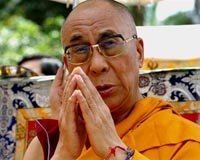 |
Washington (AFP) Sept 15, 2009 The top US military commander for Asia said Tuesday he was "cautiously optimistic" on forging a conflict-free path ahead with China, despite US concerns about Beijing's rapid military buildup. The assessment by Admiral Timothy Keating, head of the Hawaii-based US Pacific Command, came despite new US intelligence guidelines listing China and Russia as main challengers and warning that Beijing was ramping up cyber warfare. Keating, who steps down next month, pointed to China's resumption of military exchanges with the United States and its landmark anti-piracy naval mission off Somalia, where it cooperated informally with US forces. "All of which leads me to be cautiously optimistic about the way ahead with China and even more optimistic than that about the region in its entirety," Keating said at the Center for Strategic and International Studies, a Washington think tank. The United States and leading regional ally Japan have led calls for China to be more transparent about its military spending, which has grown by double-digit percentages annually for the past two decades. Keating acknowledged that China was developing "some pretty good capability" in areas ranging from submarines to anti-satellite operations to cyber warfare. But he said tensions have eased markedly since just a few years ago. "We want to draw the Chinese out, we want to ask them to manifest their intentions forward for a peaceful rise and harmonious integration," Keating said. But relations could face at least temporary hiccups, he cautioned, if President Barack Obama's administration agreed to Taiwan's request to sell it advanced F-16 fighter jets. China snapped military exchanges with the United States for months after former president George W. Bush's administration in October proposed a 6.5-billion-dollar US arms package to Taiwan that did not include the F-16s. Beijing considers Taiwan, where nationalists fled after losing China's civil war, to be a province awaiting reunification, by force if necessary. Keating said there was a "fair likelihood" China would again cut off military exchanges but noted that US policy was set by the 1979 Taiwan Relations Act. The law required Washington, which switched its recognition to Beijing, to provide the island defensive arms. "I hope China doesn't react that way. I hope that it will take a longer-term view that our country's policy on Taiwan has been on the books since 1979," Keating said. The RAND Corporation, which focuses its research on national security issues, said in a recent study that while China would face serious challenges conducting a land invasion of Taiwan, it was in an increasingly strong position in air power. With its growing power in ballistic and cruise missiles, China is in a growing position to suppress air bases in Taiwan as well as those of the United States on the nearby Japanese island of Okinawa, the study said. But China and Taiwan have been improving relations since the island elected Beijing-friendly President Ma Ying-jeou last year, ending two decades of rule by leaders who flirted with independence. While Ma himself has appealed to the United States for weapons, a senior US congressional aide said the easing tensions were reducing the sense of urgency on his request. "I'm not hearing on Capitol Hill a groundswell of pressure on the Obama administration to do more on arms sales to Taiwan," said Frank Jannuzi, the East Asia adviser to the Senate Foreign Relations Committee for the majority Democratic Party. But Congress, he said, needs to look in the long term. "I think the key thing to understand about the Taiwan-China military balance is that no amount of arms sales to Taiwan is ever going to give Taiwan the capability to defeat China," said Jannuzi. "The entire exercise is one of deterrence. It's one of trying to ensure that the Taiwanese are a hard enough target that China is dissuaded from any adventurism." Share This Article With Planet Earth
Related Links China News from SinoDaily.com
 Dalai Lama hopes to meet Obama in November: statement
Dalai Lama hopes to meet Obama in November: statementDharamshala, India (AFP) Sept 14, 2009 The Dalai Lama hopes to meet Barack Obama after the US president's maiden presidential trip to China in November, according to a statement issued after talks with US officials Monday. The statement from the Tibetan spiritual leader's office appeared to end speculation about whether the Nobel Peace Prize winner would meet Obama during a scheduled trip from India to the United States next ... read more |
|
| The content herein, unless otherwise known to be public domain, are Copyright 1995-2009 - SpaceDaily. AFP and UPI Wire Stories are copyright Agence France-Presse and United Press International. ESA Portal Reports are copyright European Space Agency. All NASA sourced material is public domain. Additional copyrights may apply in whole or part to other bona fide parties. Advertising does not imply endorsement,agreement or approval of any opinions, statements or information provided by SpaceDaily on any Web page published or hosted by SpaceDaily. Privacy Statement |